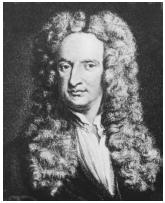Isaac Newton

ENGLISH PHYSICIST AND MATHEMATICIAN
1642–1727
Sir Isaac Newton was born on December 25, 1642, in Woolsthorpe, Lincolnshire, England. His father died shortly before he was born. Newton attended Trinity College, starting in 1661, and remained there for the early part of his career. During the year of the plague (1665 to 1666), Trinity College was closed and Newton returned to his family home in the country. It was during this one incredibly productive year that much of Newton's most important work began. In 1703 Newton was knighted and elected president of the Royal Society , a post he held until his death in 1727.
Newton's best-known contributions to science were his three laws of motion and law of universal gravitation. These were first published in his Principia of 1687. Newton's other seminal work was Opticks, initially published in 1704. Newton also developed differential and integral calculus (although with different terminology and notation than used today), fluid mechanics, equations describing heat transfer, and an experimental scientific method. His other major intellectual interests were alchemy , theology, history, and biblical chronology. While working at the Royal Mint, Newton successfully oversaw the recoinage of the nation's currency to control coin clipping (the illicit trimming of gold or silver from the edges of coins) and its related inflation.
It is historically known that Newton owned one of Europe's largest book collections on alchemy. Unfortunately, this part of his library was dispersed at the time of his death without an adequate inventory. Although Newton did not publish any large work on alchemy, the subject did continue to preoccupy him during the course of his life. Alchemy had obvious relevance to his work at the mint and its associated work on metallurgy . It also interested him because of its relevance to questions about the ultimate structure of matter. Much of Newton's published work on chemistry or alchemy appears in the form of "Queries" placed at the end of Opticks. These are rhetorical questions with postulated answers, some of which are quite extensive. Together, the Queries cover some sixty-seven pages. Query 31 alone is thirty text pages long.
Newton's postulated answers concerning the ultimate structure of matter by advancing the idea of atoms with some level of internal structure, a notion anticipating the modern concept of molecules. Newton also postulated on the existence of a nonmaterial substance, an imponderable (unweighable) fluid called ether, which might work at very small distances to repel atoms from one another. Heat, light, electricity, or the reactions of chemistry might be used, Newton suggested, to probe this subtle, imponderable fluid.
Bibliography
Andrade, Edward Neville daCosta (1979). Sir Isaac Newton. Westport, CT: Greenwood Press.
Cohen, I. B., and Westfall, Richard S. (1995). Newton: Texts, Background, and Commentaries. New York: W. W. Norton.
Manuel, Frank E. (1990). A Portrait of Isaac Newton. New York: Da Capo Press.
Newton, Sir Isaac (1979). Opticks. New York: Dover. Based on the 4th edition. London, 1730.
Newton, Sir Isaac (1999). The Principia, Mathematical Principles of Natural Philosophy. Translated by I. Bernard Cohen and Anne Whitman. Berkeley: University of California Press.
Thackray, Arnold (1970). Atoms and Powers: An Essay on Newtonian Matter-Theory and the Development of Chemistry. Cambridge, MA: Harvard University Press.